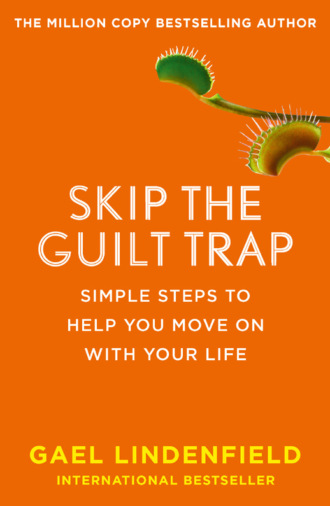
Полная версия
Skip the Guilt Trap: Simple steps to help you move on with your life
Here are some of the ways different people have tried to describe their personal experiences of guilt:
How different people experience guilt
IN THE BODY
There’s a permanent knot in my stomach.
It’s like pain and sorrow mixed with each other.
I feel like I want to cry but can’t.
I go quiet – it’s as though my throat has tensed up and I can’t speak.
It’s like a bunch of moths eating at my insides.
I often feel like I am going to be sick.
I want to hit my head … and I often do!
I find myself hitting my leg as soon as I remember it.
I want to curl up in a ball and my body starts to do that.
I feel scared and go all jittery.
I have this tension in my head – and I just can’t get my body to relax.
I want to hide – my head bows and my eyes close.
I feel like I am carrying bags of lead weights.
My head feels like it weighs a ton.
There’s like a weight on my heart.
It’s like I can’t stop sighing.
It’s weird … sometimes I just feel dirty and that I need to wash and wash … Perhaps I’m going mad, like Lady Macbeth!
IN THE MIND
It makes me think that I should not have done what I did because everyone else thinks it is bad.
I feel like my mind is going to explode.
I go over the situation again and again in my head.
I think people may be talking about me – thinking I am bad or am doing something wrong.
Thinking again and again of what my father would say if he could see me now.
I always think I am making a mistake.
I keep having flashbacks to when it happened.
I am constantly thinking that I should have done it differently, even though others are pleased …
Telling myself if only I had worked just that bit harder I could have …
It’s like I keep thinking that I will be ‘found out’.
I keep imagining what could have happened if I hadn’t been lucky.
Sometimes I feel guilty about being alive … I just can’t get it out of my mind that others died through no fault of their own.
Constantly telling myself I was such an idiot.
I can’t get the thought out of my mind that life isn’t fair – why have I got everything I have when others can’t? Just the luck of the draw.
I just worry all the time that I am getting it wrong and should know better.
It feels as though I am an impostor at work.
I just find myself dwelling on the fact that I could have done more … even though I really know I did what I could at the time.
Sometimes people are not aware that they are feeling guilt. When they first come to me, many of my clients may experience some of these ‘symptoms’ and think they are due to ill health or external stresses. If the latter have been ruled out, we will then look together at how they have led and are leading their lives. This is when it is helpful to also know what the common behavioural signs of guilt are, which may be the underlying cause of distress.
In the next chapter we will be examining in some depth the different types of guilt and the behaviours associated with each. But for the moment here are some of the more common general signs of possible guilt that you may recognise:
Behavioural signs of guilt
• Avoiding certain people or all people, or subjects of conversation.
• Playing too safe.
• Overcompensating with extremely ‘good’ behaviour.
• Overwork.
• Obsessions.
• Depression (without an obvious cause and no bipolar disorder diagnosed).
• Agoraphobia.
• Dependence on alcohol or drugs.
• Rebelliousness.
• ‘Bad’ behaviour.
EXERCISE: MY PERSONAL SIGNS OF GUILT
• Re-read the lists of physical, mental and behavioural signs that I have given above, and mark the ones that you commonly experience.
• Ask a couple of people you know what they feel and notice in their mind and behaviour when they feel guilty. You could show them the lists above. Note the differences in your experiences of guilt.
Who is more likely to feel an unreasonable amount of guilt?
Although there is no definitive research that can prove the cause of this problem, there are some reasons that are commonly accepted among therapists and counsellors as to why some people feel excessive or unreasonable levels of guilt. Below, I am listing the main ones that I have come across in my own work. Having an idea of how a problem started or was encouraged (and maybe still is) can help us to identify possible ways to deal with it.
We are more likely to get caught in a guilt trap if we:


















On reading this list you may have noticed that I did not include any gender issues. Although I often hear and read the opinion that women feel more guilt than men, to my knowledge there is no research to back up this belief. Women perhaps talk more openly in everyday life about their guilt. Men do not do this so much, but will drink, overwork or bash a boxing bag to reduce the tension, but then suppress it. However, in the confidential confines of therapy, I see little difference between the genders. Certainly the causes appear similar, as does the degree of distress.
EXERCISE: HOW PREDISPOSED AM I TO GETTING CAUGHT IN A GUILT TRAP?
1. Re-read the above list again. This time do so more slowly, giving yourself time to think about each characteristic. Mark the ones that have some significance for you.
2. Discuss with members of your family or a friend.
3. Make some notes.
Summary
• Before we can feel guilt, the neocortex regions of our brain must be fully functioning and we must able to:
a) understand the difference between the concepts of right and wrong;
b) learn and remember that there are standards that others may expect us to meet or that we ourselves may want to meet;
c) be self-aware enough to notice the sensations that we experience when guilt has been triggered.
• Guilt has evolved along with other self-conscious emotions to strengthen groups by encouraging loyalty and self-discipline.
• Guilt and shame are different. Guilt is a feeling we have when we think we have done something wrong. Shame is what we feel when we think we are a bad person because we have done something wrong.
• We may each feel guilt in different ways, even though some of the signs of guilt may be shared.
• Some of us are more predisposed to get caught in a guilt trap than others.
Конец ознакомительного фрагмента.
Текст предоставлен ООО «ЛитРес».
Прочитайте эту книгу целиком, купив полную легальную версию на ЛитРес.
Безопасно оплатить книгу можно банковской картой Visa, MasterCard, Maestro, со счета мобильного телефона, с платежного терминала, в салоне МТС или Связной, через PayPal, WebMoney, Яндекс.Деньги, QIWI Кошелек, бонусными картами или другим удобным Вам способом.








